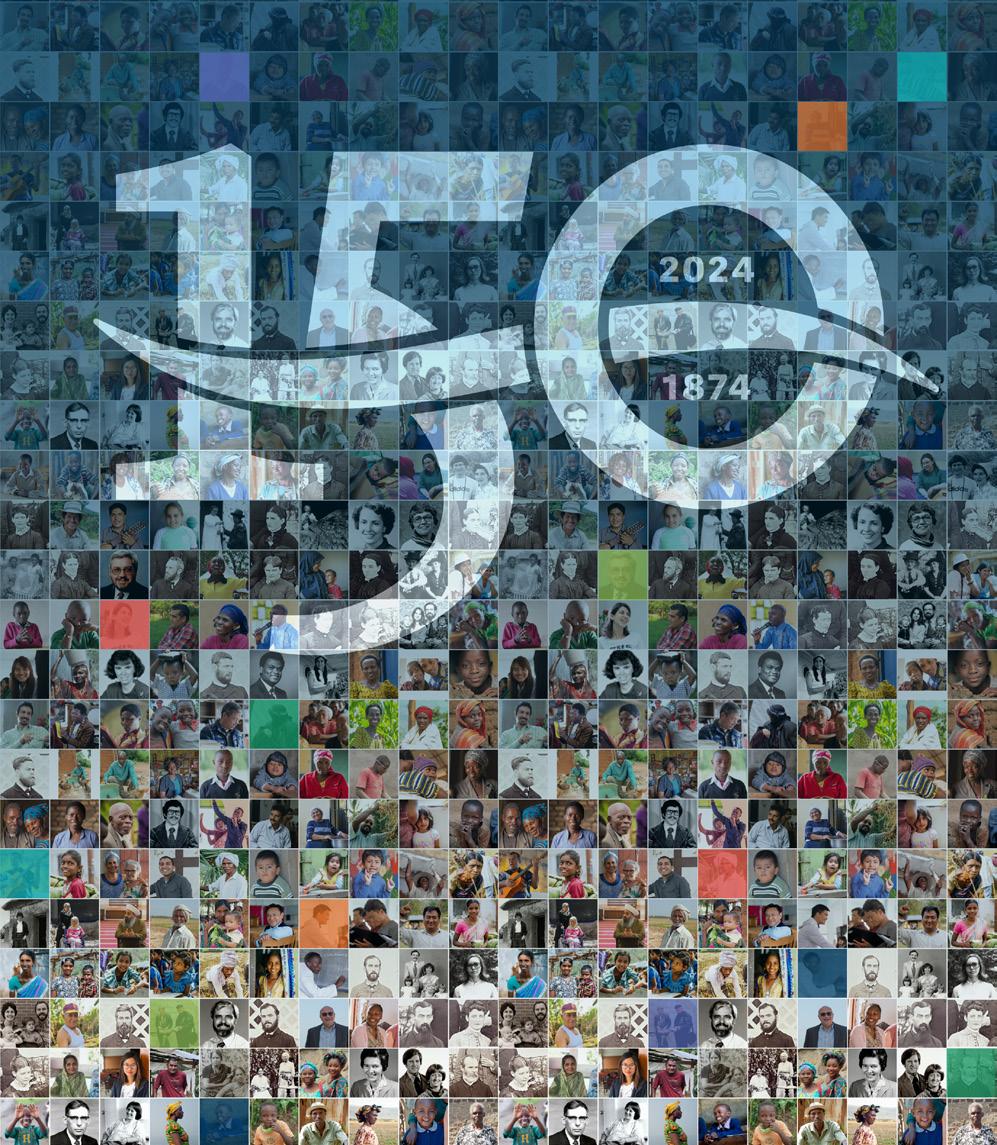
a publication of CBM spring 2024 001
Wordeed is the convergence of two seemingly distinct but indissociable dimensions of God’s mission. Wordeed Magazine is a compilation of voices, sharing wri tt en stories of how we are called to be the heart, hands, and voice of God in the world.
Wordeed Magazine is published twice a year by Canadian Baptist Ministries. Copies are distributed free of charge and available digitally at cbmin.org/wordeed. Bulk quantities available by request.
Design alivelihood.me
Illustration alibrew.myportfolio.com
Printing Splash Graphics Ltd.

7185 Millcreek Drive Mississauga, ON L5N 5R4 905.821.3533 communications@cbmin.org cbmin.org/wordeed
Contributors
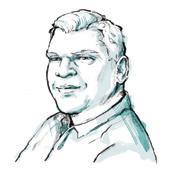
Sam Chaise Head of Program, People on the Move, BMS World Mission
Former pastor, church planter, Executive Director of CBM (2010-2015) and Christie Refugee Welcome Centre, Sam’s interests include how the gospel interacts with culture and systems that nourish human living. At BMS World Mission, Sam oversees strategy and programs that support forcibly displaced people. 15
A Way with Words with Jennifer Lau
A lot can happen in 150 years.
In the life of CBM, we’ve seen our name change several times; Field Staff come and go as God leads them; partnerships begin and end; and methods of communication evolve with technology. Yet, through it all, God’s mission stays the same and we celebrate the many lives that have been transformed by the gospel.
Several years ago, we retired Mosaic Magazine and introduced CBM Responding. This enabled us to provide concise updates of our work around the world. However, we know that many of you have missed the think-piece articles of the past.
Welcome to Wordeed Magazine — a combination of longer-form articles that o ff er an opportunity to think deeply and re fl ect, and shorter-form stories about the people and projects you support around the globe. We hope this publication will provide you a place to be inspired by our shared mission.

Catherine Cole
Team Lead, Content & Design, CBM
Born and raised in Atlantic Canada, Catherine has a passion for authentic storytelling — where every voice is valued, providing space for people to share their own unique narratives. She endeavours to continue reflecting the diversity of perspectives and richness of human experience that exist in how CBM serves globally. 22
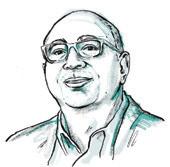
Elie Haddad Team Leader, MENA Region, CBM
Born and raised in Lebanon, Elie immigrated to Canada towards the end of the civil war in Lebanon in 1990. He worked for 15 years in Toronto before feeling called to return to Lebanon in 2005, where, as Global Field Staff, Elie joined the Arab Baptist Theological Seminary (ABTS) serving most recently as President. 13
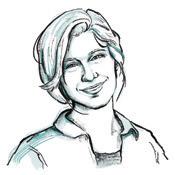
Evangeline Hammond
Global Field Staff, Lebanon, CBM
Energized by new ways of thinking and unlikely collaborations, Evangeline is eager for continual learning and challenges within meaningful projects. She works alongside THIMAR, our partner in Lebanon, to help develop and implement ministry plans that re fl ect CBM’s key causes. 8
spring 2024 001
In this first issue, we celebrate the legacy of 150 years in mission together as Canadian Baptists. We invite you to join us as we re flect on our past, present, and future by looking ahead to how God is calling us to engage for the next 150 years. Within these pages you will read more on the themes of Integral Mission and calling as some of our Field Staffshare their personal journeys. As well, we will explore the exciting growth of the global Church in these rapidly changing times. Related to this, is a closer examination of the global refugee crisis and how we can support people who have been displaced. There is much to celebrate and much to look forward to. We pray that you’ll continue to partner with us as, together, we join God in embracing a broken world through word and deed.
Jennifer Lau, Executive Director, CBM
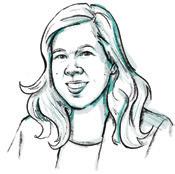
Jennifer Lau
Executive Director, CBM
Beginning her tenure as Executive Director in November 2020, Jennifer is th e first woman and layperson to be appointed to the position. Her passion is to help people situate their own faith journeys within the global community and encourage them to faithfully follow Jesus into the world.
Jennifer also serves as Vice-President of the Baptist World Alliance. 19
Wordeed
Our Movement to Integral Mission 4
I A m With You Always God’s Mission for the Church 10
Opening Doors of Refuge
The Church’s Call to be God’s Welcome 15
Our Changing World Global Trends and the Church 19
Sent Out CBM Field Staff Called to Serve 8
The Church in Sudan How God Sustains and Grows in Times of Conflict 13
From Sudan to Lesvos
Delina's Journey 17
Present Hope and Future Opportunity A Conversation with Canadian Baptist Leadership 22
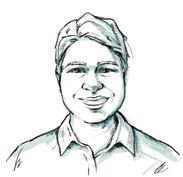
Kylah Lohnes
Program Officer, CBM
Having grown up in the Atlantic Canadian Baptist family, Kylah has cared about mission and the role of the local church for much of her life.
As a Program O ffi cer she is passionate about helping partners plan and implement sustainable projects that allow local communities to flurish using their own skills and resources. 17

David Nacho Director of Street Ministries, First Baptist Church, Vancouver Born and raised in Bolivia, David has lived in several countries in Latin America. He is CBM Field Staff Alumnus, having served in Latin America in various positions. In addition to serving at First Baptist Church, Vancouver, he is also pursuing a PhD program at the Oxford Centre for Mission Studies. 10

Terry Smith
Senior Associate, CBM
Terry and his wife, Heather, served with CBM in France for 20 years, focusing on inner-city youth, urban church planting, theological education, and leadership development. Upon their return to Canada, he was Director of International Partnerships and then, Executive Director of CBM, from 2015 – 2020. 4
by Terry Smith


Our Movement to Integral Mission
Retronyms and neologisms not exactly the fl ashiest words to begin an article for CBM. Online dictionaries de fi ne the two words thus:
A retronym is a newer name for an existing thing that helps di fferentiate the original form from a more recent one. It is thus a word or phrase created to avoid confusion between older and newer types, whereas previously (before there were more than one type) no clari fication was required. Example: We drank our regular co ff ee with whole milk and ate organic food as we listened to an acoustic guitar.
A neologism is a relatively recent and isolated term, word, or phrase that nevertheless has achieved some popular recognition. Example: Hunkered down during a snowmaggedon, we laughed at memes and ate our vegan brunch.
When we describe CBM’s ‘preferred’ option in sharing
the gospel, we tend to use a retronym — Integral
Mission, and occasionally, sneak in a neologism, Wordeed.
When we describe CBM’s “preferred” option in sharing the gospel, we tend to use a retronym Integral Mission and occasionally sneak in a neologism Wordeed.
Canadian Baptists have been on this journey for more than 150 years, when valiant servants of God responded to his call to mission beyond our borders prior to the existence of a mission board. They lefttheir homes and loved ones, crossed oceans and mountain ranges, learned new languages and customs, to reach the lost. Just how did those early missionaries, and more recently, Field Sta ff , engage people groups in cross-cultural mission?
4 wordeed · spring 2024 reflection

Consider these two lists of words; Preaching Demonstrating
Word Deed
Proclamation Presence
Justice Mercy Mouth Hands
Evangelism Soc ial action
Converting Hea ling Faith Works
Salvation Development
Believing Liv ing
Saying Doi ng
Soul care Soc ial care
Certainly, some of our forebearers were drawn more to one expression of Christian witness, while others, sometimes on the very same team or working in the same region of the world, opted for the other.
One such example is Jane Buchan (1837–1904) who rallied countless women in Canada to assume a critical place in the mission of the Church, including education and human rights. In 1876, Jane and her sisters helped create the Women’s Baptist Foreign Missionary Society
of Ontario West and launched a periodical, the Canadian Missionary Link. A keen activist in missionary activity, Jane focused on India where the work had a strong social engagement.
Buchan advocated against the practice of Sati, where widows were burned alive on the funeral pyres of their deceased husbands. She wrote against the caste system and promoted outreach and development among the lowest caste (Dalits, or the untouchables). Over the years, she helped raise thousands of dollars for development projects such as dispensaries, schools, and shelters for women. By the time of her death, Baptist women in Ontario were supporting 14 female missionaries in India and a ne w field in Bolivia was being opened.
Like others of her generation, Jane was a practitioner of integral mission, long before the term was coined. She was part of a movement of believers whose passion was lit for a newer, more holistic understanding of God’s mission in the world. Many Canadian Baptists at the time were accused of touting a "social gospel" by being overly concerned with the welfare of people, when some felt the priority should have been placed on “the conversion of souls”.
reflection 5 wordeed · spring 2024
At that time, many Baptists were anxious to distance themselves from this group and get “back to the fundamentals”. They were part of the revivalist movement of the 19 th and early 20 th century that focused on personal salvation and individual spirituality. Church historian, Timothy L. Smith, coined the term “ The Great Reversal” to describe the about-face many evangelicals made from a sense of deep social concern for others to a focus on personal and private salvation. They feared that with the rise of the social gospel movement, the Church would be over-run with liberal theology.
An intense debate was waged concerning the priorities of Christian mission.
As Canadian Baptist missions activities grew fi rst in India, then Bolivia, and by the late 1950s, in Angola and the Congo s ome missionaries held an unwavering zeal for preaching the gospel while others were passionate about the humanitarian dimension of their faith. Christians advocated for human rights, religious freedom, vocational training programs, and land reform acts, such as in Bolivia where Canadian Baptist missionaries championed the rights of local farmhands to own the land they worked. But for some, the zeal for humanitarian service began to outweigh the passion and enthusiasm of reaching the world for Christ. They felt that traditional forms of evangelism had neglected a thoughtful engagement with culture.
There was a time CBM’s office building in Mississauga had two di fferent colours of carpet. On one side of the building was the relief and development ministries, The Sharing Way: they had green carpet. They had amazing programs in food aid, maternal health, soil improvements, microcredit, and vocational training. They were founding members of Canadian Foodgrains Bank, which today, still seeks to offer a Christian response to global hunger.
The other side of the building housed those involved with evangelism, church planting, discipleship programs, theological education, and Christian literature: they had red carpet. Along the halls of each side of the building were maps and pictures, showing places and people whose lives were being impacted by noble and valuable Christian mission.
Though very real, the di fferent carpet colours are a metaphor of the state of the Church by the second half of the 20th century. For some, mission was the work of building healthy local churches and equipping leaders for gospel ministries. For others, mission was about alleviating the su ffering of the world’s poor. But why did this division exist? Is it right that we had separated the two dimensions of Christian witness?
In 1982, Rev. Bob Berry wrote a poignant article in Enterprise Magazine entitled “Mission: What It Is and What It Isn’t”, in which he invited the readers, in light of the Great Commission and the Great Commandment to consider the Great De fi nition. He juxtaposed Dr. Donald McGavran’s stance, “ The highest priority (is) bringing men into living relationship with Jesus Christ … ( by) proclaiming Jesus Christ and persuading men to become disciples and dependable members of His church,” and Dr. J. G. Davies position that “mission is concerned with overcoming industrial disputes, with the surmounting of class divisions and the eradication of racial discrimination.”
For Rev. Berry and other church leaders, the truth lies in a “both-and” position, and he invited Canadian Baptists to embrace John Stott’s position that “Mission describes … everything the church is sent into the world to do.”
A Retronym is Born
In 1974, Christian leaders gathered to establish a new direction in world evangelization resulting in The Lausanne Covenant. It forged a new articulation of the interconnectedness of evangelism and social action.
Although reconciliation with other people is not reconciliation with God, nor is social action evangelism, nor is political liberation salvation, nevertheless we a ffi rm that evangelism and sociopolitical involvement are both part of our Christian duty. For both are necessary expressions of our doctrines of God and man, our love for our neighbor and our obedience to Jesus Christ … Th e salvation we claim should be transforming us in the totality of our personal and social responsibilities. Faith without works is dead.1
Over and against this background, and with the unexpected voice of the Church in the Majority World, the movement towards integral mission began to take root.
In the mid-1980s, the Latin American Theological Fraternity, which included René Padilla, were challenged by the teachings of Latin American Catholic theologians who emphasized that Jesus’ salvation included liberation for the poor and oppressed. They saw the local church as an agent for positively transforming the wider world, in response to the Good News.
The Spanish term “misión integral” was coined in the 1970s by Padilla and others. It described an understanding of Christian mission that embraced both the proclamation
6 wordeed · spring 2024 reflection
Integral mission goes beyond our actions or our words and integrates our entire being. It is the Church living out its faith in Jesus in every aspect of life and witness.
and the demonstration of the Good News of Jesus Christ. They chose to use the word “integral” to signal their discomfort with conceptions of Christian mission that had separated evangelism from social involvement or responsibility. Padilla pointed out that the concept of integral mission is nothing new rather, it is rooted in Scripture and exemplified in Jesus’ own ministry.
The Latin American Theological Fellowship was concerned with the dichotomy between the life of the Church and its mission. Mission was not just about sending people to overseas ministry. If the local churches back home “should just give, pray, and stay out of the way,” then mission inevitably ceased being at the centre of the Church’s purpose it lost its place as being God’s intention for redeeming and transforming all of creation.
Padilla wrote, “When the Church is committed to Integral Mission and to communicating the Gospel in everything it is, does, and says, it understands that its goal is not to become large numerically, nor to be rich materially, nor powerful politically. Its purpose is to incarnate the values of the Kingdom of God and to witness to the love and justice revealed in Jesus Christ, by the power of the Holy Spirit, for the transformation of human life in all its dimensions, both on the individual and the community level.”
The purpose of mission is transformation, so that God is glorified in all dimensions of life including relationships with God, others, and creation itself. The goal of evangelism is not simply conversion but the creation of a new community that confesses Jesus Christ as Lord of all aspects of life and that lives out this confession in word and deed.
Padilla pointed out that central to integral mission is a concern with all the basic needs of people including God’s grace, loving relationships, shelter, clothing, mental and physical health, and the sense of human dignity. Human life in its very essence (according to the Scriptures) is body, soul, and spirit. Accordingly, the mission of God cannot be reduced to so-called “spiritual” needs such as forgiveness or to physical needs such as adequate nutrition.
Integral mission goes beyond our actions or our words and integrates our entire being. It is the Church living out its faith in Jesus in every aspect of life and witness.
WORDEED : CBM’s Neologism
When CBM released a short “primer” on integral mission in 2013, we coined the term Wordeed, as the convergence of two seemingly distinct but indissociable dimensions of God’s mission in the world. Inspired by the vision of the Prophet Micah, who, almost 3,000 years ago, called God’s people to ethical engagement and witness, we adopted the principles and practices laid out by the Micah Network (a global Christian network of organizations and individuals) which de fi nes integral mission this way:
Integral mission or holistic transformation is the proclamation and demonstration of the gospel. It is not simply that evangelism and social involvement are to be done alongside each other. Rather, in integral mission our proclamation has social consequences as we call people to love and repentance in all areas of life. And our social involvement has evangelistic consequences as we bear witness to the transforming grace of Jesus Christ… As in the life of Jesus, being, doing and saying are at the heart of our integral task.
The term might be new, but the idea isn’t new at all. There are many examples both modern and historical t hat illustrate integral mission, or Wordeed. Ultimately, the local church is the primary means by which God works out his mission purposes. Your church, in partnership with all other local churches, has been created to carry forward the ministry of Christ. Like Jesus and his fi rst followers in the early church and throughout the last 2,000 years, we are called to be the heart, hands, and voice of God in the world. We do so, through integral mission. And the journey has just begun.
1 https://lausanne.org/statement/lausanne-covenant?gad_source=1#cov
7 wordeed · spring 2024 reflection
by Evangeline Hammond
Sent Out
CBM Field Staff alled to Serve
As a child growing up in a western Canadian Baptist church, I felt that CBM Field Staffwere akin to Christian action stars; dare I say the “Sylvester Stallones” of Baptist ministries. Clad in gingham and khaki, their stories of far-offplaces and risks taken for the kingdom were the stuffof legend. In my memory these people radiated courage, clarity, and tested resolve they were con fident they were called to the field to serve.
Th is past fall, I became one of CBM’s newest Field Staffas I joined the MENA (Middle East and North Africa) team based in Beirut, Lebanon. But courage is hardly the word I would use to describe my own daily service, as I attempt to order a falafel with correct Arabic grammar.
For some, determining your call is a logical use of natural talents to meet a need in the world. Others feel that calling involves direction by the Holy Spirit to work within speci fic parameters revealed through prayer, opportunity, and a ffi rmation by one’s spiritual community. Still others would say that signi ficant feelings such as passion or peace are markers of calling.
Th roughout CBM’s 150 years, many Field Staffhave been sent to serve the global Church. Each has felt called, but those callings have worked themselves out in di fferent ways.
Muriel Bent saw a natural connection between her skills as a nurse
and providing medical care to rural communities in India with CBM.
Tom* received a call to train pastors in Asia before he was ready (didn’t speak the language, the country restricted outsiders, no pastoral experience). But the idea “stuck in [his] soul.” It wasn’t until many years down the road, a fter ministering with Asian communities in Canada, that Tom and his wife served with CBM in Asia doing just as he had been told decades before trai ning pastors.
For Elie Haddad, MENA Team Leader, passion is integral to calling, but it can come a fter the decision. He and his wife, Mireille, originally from Lebanon, had a rich church community in Canada and ministries within the business world. They had no desire to leave, yet over time they heeded the call to serve in their homeland. Elie shares, “There was a sense of peace about the decision that was very important but the strong passion and desire to work [in the Middle East] came further down the road. Now we are certain our path is here.”
Like so many, my path to service was slow and winding. My fi rst encounter with Lebanon happened years ago when I had wrapped up my master’s degree in education and impulsively lefta steady job for an internship program with the Mennonite Central Committee. MCC sent me to Lebanon during

what turned out to be one of its most turbulent years that included a revolution, economic catastrophe, the pandemic, and a devastating explosion in the Beirut harbour.
A fterwards, the pull back to Beirut was insistent despite the instability and struggles I would face as well as not knowing the work I was meant to do. The decision to return came fi rst, then the opportunity, and eventually the peace.
I had plenty of opportunity to use the skills and experience I had picked up over the years to work with CBM’s partner in Lebanon, THIMAR. I have a background in education, youth ministry, community development, and relief project monitoring. Th is, along with the outpouring of support from my community, was the con fi rmation I needed.
Now, I am humbled as I learn a new culture, language, and how ministry works here. I am totally dependent on the kindness and mentorship of my Lebanese family and co-workers. And I am simultaneously inspired and energized by the Kingdom work of the Church here.
And I know I’m not alone.
8 wordeed · spring 2024 action
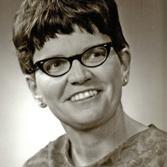
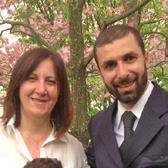
Emad and Almess Botros have served with CBM in Lebanon since 2015. Emad notes, “Calling does not necessarily change, but it grows, matures, and becomes clearer.”
The theme of change is evident in the stories of the Field StaffI’ve listened to rejected visas, displacement, career changes, long pauses, etc. Yet they are also marked with persistence, especially in the face of risk.
Many Field Staffserved during times of Christian persecution, political instability, and war. A month a fter I arrived in Lebanon with CBM, the Middle East was plunged into turmoil. On October 7, attacks on Israeli citizens by Hamas militants led to the mass killing of Palestinians and displacement of over 90,000 Lebanese citizens from cross-border airstrikes.
The Harveys had been serving in Angola when a terrible civil war broke out. Charlie explains that the wellworn phrase “the safest place is in God’s will” can be misleading. “God doesn’t have an obligation to keep us (physically) safe,” he argues. While you should absolutely make prudent choices, “if you’re living for Jesus, and really listening, you’re likely going to experience risks.” Essentially, safety isn’t really part of the job description of following one’s call.
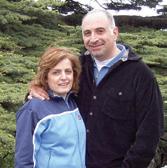
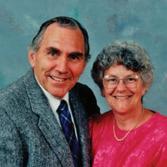

Some may be called overseas, but all are called to follow Christ by serving others, binding wounds, and pursuing justice in building God’s Kingdom.
While there are many unknowns, one thing is clear about calling t he entire body of the Church has been given a call. Elie explains that the “sent-out-ness” of the Church is fundamental. Some may be called overseas, but all are called to follow Christ by serving others, binding wounds, and pursuing justice in building God’s Kingdom.
Theologian, Os Guinness, defi nes calling as: “the truth that God calls us to himself so decisively that everything we are, everything we do, and everything we have is invested with a special devotion, dynamism and direction lived out as a response to his summons and service.”
I think back to the resolute and fearless missionary I imagined as a child. My experience now reveals something markedly more human. I’m beginning to see the khaki and gingham not so much a sign of supernatural strength and courage, but
of a chosen vulnerability. If there is a thread that connects Field Sta ff past, present, and future it is that we each made the choice to go out. And out comes with risk.
We’ve chosen to expose ourselves to what Suzanne Taylor beautifully referred to as “good grief” t he simultaneous breaking yet deepening and softening of the heart that comes with living and serving next to the marginalized. And because of this exposure, we witness God move in powerful ways.
How does calling work exactly? I still don’t know. I’m just so glad it does. Because I am convinced that the history of CBM is woven by threads of individuals who followed theirs, however mysterious and meandering.
* Last name omitted for security reasons.
9 wordeed · spring 2024 action
God’s Mission for the Church
10 wordeed · spring 2024 reflection
by David Nacho
When we love someone and they aren’t with us, we feel their absence. Some absences are an inevitable part of life, some come about because people choose paths, activities, or opportunities that take them away from where they once were. Other absences occur out of hurt or hurtful actions. Jesus’ community of friends was no di fferent.
Th en the eleven disciples went to Galilee, to the mountain where Jesus had told them to go. When they saw him, they worshiped him; but some doubted. Th en Jesus came to them and said, “All authority in heaven and on earth has been given to me. Th erefore go and make disciples of all nations, baptizing them in the name of the Father and of the Son and of the Holy Spirit, and teaching them to obey everything I have commanded you. And surely I am with you always, to the very end of the age.”
(Matthew 28:17-20)
Notice how, rather than simply saying “the disciples”, the Gospel of Matthew speci fically mentions eleven. However, not long before this passage, Jesus’ community used to have a core group of twelve friends, even calling them brothers. Of course, the number of disciples has deep symbolic meaning as it points back to the whole people of God, the twelve tribes of Israel. The absence of one was signi ficant; their community had experienced loss. Yes, they were witnesses of the resurrection, but they were still a hurt community of eleven, instead of twelve. Moreover, we con fi rm that this community was frail and wounded when we see that some disciples worshiped while others doubted when they saw Jesus.
But here is when we encounter Good News: Jesus comes to them one more time and gathers them around himself. Jesus had promised that he would meet them in Galilee, and he does. Their community needed to experience the Good News again and Jesus faithfully meets them.
But that is not all! Jesus goes one step further and entrusts this community with God’s desire and purpose of redemption: “Beloved, wounded, doubting friends, go make disciples; don’t leave anyone out!”
Mission is for communities. More speci fically, mission is for broken communities.
Mission is for communities. More specifically, mission is for broken communities.
11 wordeed · spring 2024 reflection
Jesus is doing the gospel work in and with this wounded community. He is asking and entrusting his friends/brothers/ community to tell a story about abundant life. It is Jesus’ story, but it is also the story of the community that recognizes him as Lord. It is a story that contradicts the one that was most convenient for the religious and political power of the day:
While the women were on their way, some of the guards went into the city and reported to the chief priests everything that had happened. When the chief priests had met with the elders and devised a plan, they gave the soldiers a large sum of money, telling them, “You are to say, ‘His disciples came during the night and stole him away while we were asleep.’ If this report gets to the governor, we will satisfy him and keep you out of trouble.” So, the soldiers took the money and did as they were instructed. And this story has been widely circulated among the Jews to this very day.
(Matthew 28:11-15)
Jesus’ story of triumph over death is witnessed by women. In that day, the testimony of a woman was worth much less than the testimony of a man. And yet, Jesus chose women as the fi rst witnesses of his resurrection, and he greets them with these words that changed everything: “Do not be afraid.”
The story of Jesus’ triumph over death started with lowly witnesses and a broken, doubting community. What does that mean for us the Church?
Perhaps the most important lesson I learned during the 15 years that my family and I served in various Latin American countries is that the Good News of the gospel is best communicated, best represented, and best lived out not by individuals with specialized training, such as myself, but by local communities of faith. These churches intentionally invite and welcome broken people to be part of them, to share life together, to enjoy the fellowship and companionship the y fi nd in Christ.
I think of the church in La Paz, Bolivia, that used their annual Vacation Bible School to provide dental care for children in a poor neighbourhood, or the church in Costa Rica that sees cleaning up the riverbed as part of their witness to the community, or the faithfulness with which my current church in Vancouver has served and witnessed to the city’s marginalized for decades.
These churches are not perfect. They often lack resources, the leadership is not always properly trained, many times they lack a building of their own, and
Christ is still entrusting his story of abundant life to lowly, broken, and even doubting individuals and communities — a story desperately needed in a world oppressed by the weight and deceit of other stories.
sometimes the authorities are against them. These communities of disciples are, and will be, loving yet broken, worshipful yet also doubt- fi lled ju st like this community of disciples that we see in the passage we know as The Great Commission.
Christ is still entrusting his story of abundant life to lowly, broken, and even doubting individuals and communities a story desperately needed in a world oppressed by the weight and deceit of other stories. Stories that lead to war; stories that lead to racism; stories that lead to death. The Good News of God’s burning desire for all nations must be shared today.
The woundedness, doubt, and anxiety of the fi rst community of friends was no barrier for Jesus to continue to do his work in and with them. Our own woundedness, doubt, and anxieties are no barrier either. Remember his words: “Surely, I am with you always, to the very end of the age.”
“Surely, I am with you always.”
12 reflection
by Elie Haddad
The Church in Sudan
How God Sustains and Grows in Times of Conflict

When I returned to Lebanon from Canada in 2005 to serve with the Arab Baptist Theological Seminary (ABTS), a good number of seminary students were Sudanese. Sudan and South Sudan were still one country at the time. God had been using the Sudanese leaders who graduated from ABTS to change the landscape of the ministry in the country. Their genuine faith, faithfulness, and passion for God and their country were contagious. I fell in love with the church in Sudan long before I was able to visit.
I fell in love with the church in Sudan long before I was able to visit.
A fter years of civil war, the people in the south overwhelmingly voted for separation from the Republic of Sudan, which was under strict Islamic rule. South Sudan officially seceded from Sudan on July 9, 2011. Up until that time, most Sudanese leaders trained at ABTS were from the south where the majority of the population is (culturally) Christian, while the majority in the north is Muslim. The flourishing churches and ministries in the north, especially in Khartoum, were served by leaders who came from the south.
When South Sudan gained its independence, most leaders serving in the north were forced to move south. Th is created a leadership gap. However, we noticed that God had already been sending waves of northern Sudanese leaders to ABTS to be equipped for ministry.
Yousif and Sousanna are two of those leaders. Both were active in ministry when they came to ABTS to be equipped. By the time they returned to Sudan from ABTS, the ministries in Khartoum were passing through di fficult times due to the departure of many leaders. They immediately immersed themselves
13 wordeed · spring 2024 action
into church ministry and were sent to a poor and unreached area south of the city to start a church. They planted themselves in the community and started a vigorous visitation ministry, reaching out to people and sharing the love of Jesus with them. Very soon they had led many in the community to Christ, discipled them, and built a simple clay church building for regular worship. Yousif and Sousanna, along with other leaders, repeated this evangelistic strategy many times until the war in Khartoum displaced most of them a sad and painful reality of ministry amidst con fl ict. Wherever they go, Yousif and Sousanna continue to gather people and preach the message of God’s love for them.
We can usually discern what God is doing in a community by the quality of leaders he raises. Most Sudanese church and ministry leaders have faced a lot of hardship as they proclaim the gospel within their communities, but that does not discourage them. On the contrary, it increases their determination and boldness.
Awad is another determined leader that God has raised up. Because of the repeated con fl icts in his region of South Sudan, he had leftas a refugee to Uganda where he came to faith in Jesus Christ. He moved to Beirut to study at ABTS and be equipped for ministry back in his home country. When the pandemic began, and ABTS had to close the classrooms, the students went back to their homes to complete the academic year online. Awad went back to South Sudan. Continuing his studies was not an easy feat as he had to commute for more than one hour each way to an internet café to be able to study. However, he was undeterred by the challenges and fi nished his studies successfully. He then poured himself into ministry, starting with his immediate family, which was challenging given the animism and worship of ancestry
The church in Sudan provides a powerful example of how God sustains and grows the ministry even during times of conflict
in their culture. Yet, God used Awad to transform their gatherings into worship of Jesus and they planted their fi rst church under a tree. They had to wait for the rainy season to baptize new believers because of the lack of water in the region. Little by little they moved into a simple straw structure. Now, Awad has trained multiple leaders who are helping lead several church plants despite the di fficulties.
What we see in leaders like these is what we read about in the book of Acts. Churches are being planted as they are forced to move from one place to another. They have the special giftof connecting with new communities and sharing the love of Christ, beginning new ministries wherever they go.
The Church in Sudan provides a powerful example of how God sustains and grows the ministry even during times of con fl ict. To witness what God is doing through these remarkable leaders is incredible. God is drawing people to him from all sorts of cultural and religious backgrounds and is raising faithful women and men who are passionate about his mission. It is such a privilege for us at CBM to be partnering with these leaders in spreading the message of the Good News. We partner by coming alongside them in ministry and relief projects, and bene fit from these partnerships by learning from them and from what God is doing in their midst.
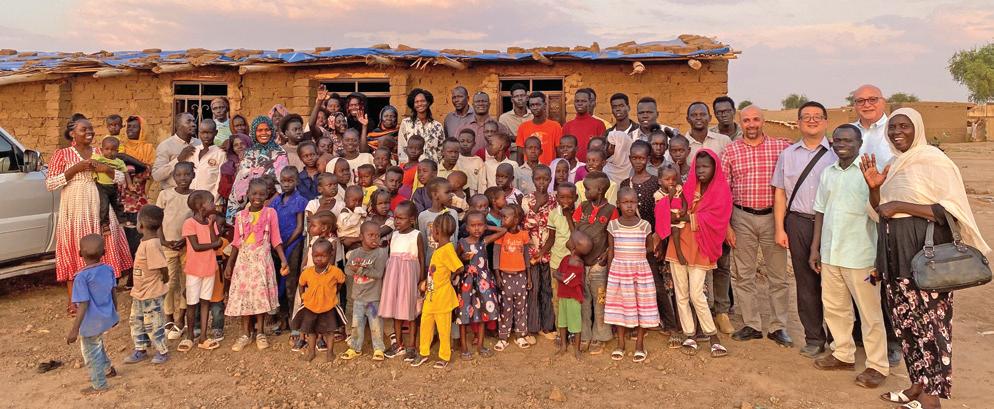
14 wordeed · spring 2024 action
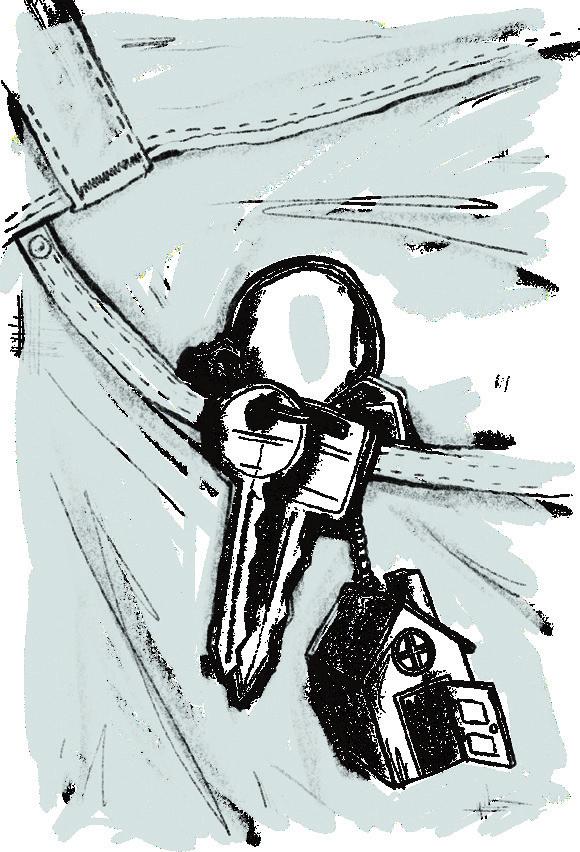 by Sam Chaise
by Sam Chaise
pening Doors of
Refuge O
The Church’s Call to be God’s Welcome
My entire adult life I have only had one thing in the right pocket of my trousers. My keys.
Those keys start my car, unlock the doors to my office and my home, and any other doors open to me in that season of life.
Forcibly Displaced People (FDP) have no keys in their pockets. In order to escape danger they have had to leave behind all the doors that were “open” to them. They have lost not only their house, but also everything that made their house their home: family, friendships, community, workplace, church or other place of worship, and more. Everything that de fi ned them that de fi ned their place in the world has been left ehind.
Everything that define them —that defined their place in the world has been left behind.
They flee because of circumstances beyond their control. Refugees are not economic migrants. They are not seeking a better life, they are seeking a safe life. They are escaping from serious threats that put their lives in danger. Some dangers are from natural disasters, but many are caused by humans through wars, civil con fl ict, failed or corrupt states, and terrorism.
We often use the word “refugee” as a blanket term for all migrants, but there are clear distinctions. The term “refugee” applies to people who have crossed a border and have been given refugee status by a country or the United Nations, i.e. their refugee claim has been processed and approved. Th is is not the same as the term “asylum-seeker” or “refugee claimant” (the Canadian term) which applies to people who have crossed a border and made a refugee claim but have yet to undergo the approval process. There is also another term, “internally displaced,” which applies to people who have fled danger but remained in their country. The more general term, Forcibly Displaced People, applies to all of these groups.
Forcible displacement is not a new thing:
• Joseph was tra fficked to Egypt and sold into slavery.
• The Israelites were forcibly displaced, living in exile a fter they were conquered.
• Mary and Joseph took the baby Jesus and fled danger from the murderous tyrant, Herod.
15 wordeed · spring 2024 reflection
When I worked in the refugee sector in Canada, governments and other non-profit oranizations often mentioned the Church in a positive light because it is well-known for being helpful to Forcibly Displaced People.
However, there are a record number of approximately 110 million FDPs today, which is 1 out of every 80 people! Most of them don’t get very far: 76% are temporarily hosted by low- and middle-income countries nearby. Some will eventually return home, but many won’t. A very small proportion of FDPs make it to Canada and fall into 3 categories:
• Government-sponsored refugees
• Privately-sponsored refugees
• Refugee claimants who will go through the refugee determination process (but have to leave if their claim is unsuccessful).
Churches in Canada have been ahead of our culture for many decades in privately sponsoring refugees. When I worked in the refugee sector in Canada, governments and other non-profit organizations often mentioned the Church in a positive light because it is well-known for being helpful to Forcibly Displaced People. Today, in addition to sponsoring refugees, we have a new opportunity to come alongside asylum-seekers as they wait for their refugee claim to be heard. As the Church, how might we re flect and respond to the reality of record numbers of Forcibly Displaced People in our world and in Canada? Here are some thoughts:
1. Use Proper terminology. The term “illegal immigration” is often misused. It is not illegal for an asylum-seeker to come to Canada to seek refuge. International law states that human beings have the right to seek refuge from danger; this law was put into place as a result of the Holocaust genocide of Jews. Canada has a world-class hearing process for asylum-seekers. If their claim is valid, they can stay, otherwise they have to leave.
2. Get equipped. Loving others is what we are called to do, even across cultural and language barriers. The International Association of Refugees Canada is a Christian mission agency that specializes in working with refugees and is an excellent source of training. Plenty of online resources are also available.
3. Become familiar with your context and connect with others for support and possible collaboration. Find out
what resources are available to FDPs, what gaps might still exist, and how you might partner with others. Many Canadian cities have local Christian refugee houses that are sources of knowledge and potential partnership. The Welcome Church initiative and the Kentro Christian Network are great places to start.
4. Advocate. Become a voice for FDPs. When conversations around you are using inaccurate terms, add some factual knowledge to the conversation. Encourage your local church to become aware of and involved in this type of ministry. If there is a debate in your city about refugees or asylum-seekers, add your voice.
5. Respond as the Church with the love of Jesus. “You shall also love the stranger, for you were strangers in the land of Egypt.” (Deut. 10:19). God called Abraham to be a blessing to the nations, and the Church inherits this call. The story of Pentecost is, among other things, a story of God blessing every nation. At the end of time, Scripture tells us that nations of the earth will enter the Holy City. Clearly, the Church is meant to be a place of welcome to all cultures inc luding refugees and asylum-seekers. Unlike governmental or NGO resources, the Church has something unique to offer: friendship. A local church can be an ecosystem of welcome, that helps Forcibly Displaced People fi nd home, integrate into Canadian culture, and feel less alone.
A 50-person Baptist Church in Sudbury, Ontario changed my life when they welcomed me and my family to Canada. My parents weren’t refugees, but as immigrants we were the fi rst people from India living in this small, very white mining town. I grew up with absolutely no memory of racism or exclusion. We were welcomed warmly and integrated quickly into the church. It became home for us; we belonged. Th at’s why I believe that the Church inc luding small churches are uniquely positioned to be the welcome of God to newcomers in general and refugees in speci fic. Calvary Baptist Church did it for me. Today we can do it for others.
What fi rst steps might you take to help someone put keys back into their pockets?
16 wordeed · spring 2024 reflection
by Kylah Lohnes
From Sudan to Lesvos
Delina’s* Journey

“I was born in Eritrea. When I was three years old, we moved to Sudan. I lived with my mother, brother, and sister; I was the oldest. When my father died, I had to earn money. I worked 12 hours a day in a hair salon fo r fi ve years . I fl ed because of the war. I fl ed alone.
I fl ew fr om Sudan to Türkiye by plane. I met a girl in Türkiye, we went to Lesvos together, and are still fr iends. I spent one month and ten days in prison because I had no papers. Th e police in Türkiye are a big problem for us.
We took a boat to Lesvos. Th ere were 45 of us on the boat. When we were near the coast of Lesvos, the boat tipped over because of the high waves . Th ree people died.
We hid in the forest. At some point we called the UN. Th ey came with the police and took us to the camp. I’ve been living there for six months now.”
Th is was Delina’s * journey from Sudan to Lesvos, a Greek island in the Mediterranean Sea. Lesvos is home to thousands of refugees and asylum-seekers, people who are living in limbo between their homeland and fi nding a safe place to live.
In Lesvos, the government-run Mavrovouni Refugee Camp was intended to house approximately 2,500 people but it is often overcrowded and has hosted as many as 22,000 people at one time. In early 2024, the camp’s population was around 6,000.
Due to the overcrowding, residents of the camp are o ft en given only a few metres of living space, usually a tent or structure the size of a shipping container shared by multiple families and positioned only centimetres away from other accommodations. Access to adequate food, clean water, showers, and other basic infrastructure is challenging and there is o ft en not enough to go around.
When Delina arrived in Lesvos, she shares, “I was simply happy for a moment. But soon I had a lot of stress again. I haven’t had a decision on my asylum process yet. Life in the camp means so much stress. We have to wait a long time for decisions [to determine our status]. Waiting makes us even more stressed. Many women, including me, are in pain because of all the stress.”
“I fled because of the war. I fled alone”
eritrea
sudan
türkiye
17 wordeed · spring 2024 action
In these situations of great need, CBM’s partner All4Aid steps in to share Christ’s love by offering support for refugees and asylum-seekers. All4Aid is a faith-based nonprofit organization registered in Germany that works internationally with displaced people in transit such as Lesvos, Greece. Here they operate community centres which provide a safe haven while meeting practical, emotional, and spiritual needs.
In 2023, All4Aid’s community centre in Lesvos provided 3,695 high-quality loads of laundry, 3,966 showers to women and girls, food for 5,984 families, hygiene items to 2,281 women and 2,485 children, and wellness services to 374 women.
Essential items are offered in the form of a “free store” where people can choose what they would like from a variety of options according to their preferences. Language classes, art clubs, and peer support groups are also available for those interested in learning new skills or needing to
talk about their experiences. These services not only meet people’s basic physical needs, but also provide an environment for rest, healing, comfort, and connection.
Delina received the essential care she needed from All4Aid, and now she volunteers there. “I do a lot of the women’s hair and clean the showers. It’s good because I can work and then I don’t think so much. If I have nothing to do, I wait for [the] decision [of my status] and then I have a lot of stress again. And I love the team, they always help me. I need a positive decision. I am strong for my family. I know they need me. Th ey are still in Sudan, and I am a fraid for them. We can’t talk on the phone every day because there are too many problems in Sudan.”
Re flecting on the stress of life in the refugee camp, Delina says, “ Th at’s why I want to thank All4Aid. Th anks to them I manage to forget my worries for a while.”
CBM’s partners around the world are stepping up to fill the gap by not only meeting people’s basic needs, but doing so while honouring the dignity, agency, and image of God in each one.
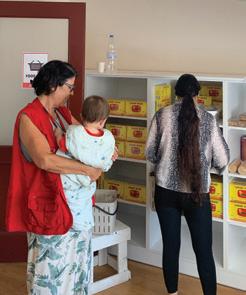

Organizations, such as All4Aid, provide opportunities for refugees and asylum-seekers to heal from their trauma and envision a new future for themselves and their families. A future in which they have the opportunity to be active participants in building communities of hope and encouragement, working towards the peace we all crave.
While the number of people forced to leave their homes continues to rise, the resources to care for them remain limited. CBM’s partners around the world are stepping up to fi ll the gap by not only meeting people’s basic needs, but doing so while honouring the dignity, agency, and image of God in each one. As another Eritrean volunteer in Lesvos said, “ Th e world should accept refugees. Th ey have always existed and will always exist. We are human beings like everyone else.”
* Name changed.
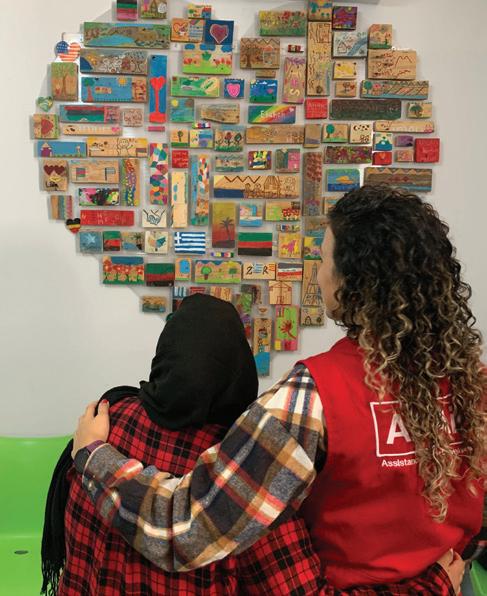
18 wordeed · spring 2024 action
by Jennifer Lau
O ur Changing W rld
Global Trends and the Church
LMost days, we wake up assuming today will be another uneventful day with little disruption to our daily activities. This is not the case for many ...
ast October, I returned from Beirut, Lebanon a fter a wonderful week celebrating 25 years of God’s faithfulness with our partner, THIMAR. My heart was full from listening to stories of how God’s Spirit is moving in the Middle East and North Africa. My head was equally full of new ideas of how to come alongside that work and support these faithful brothers and sisters, even in the face of persecution and hardship. Five days later, we all woke to the news that there had been an attack in the Gaza Strip. Thousands were dead and many more injured. Ongoing con fl ict in the southern part of Lebanon intensi fied. Despite our hopes and prayers, a full-scale war had begun. Con fl icts that had been brewing for years rose to the surface and the region was once again thrown into turmoil. The following weeks were fi lled with uncertainty for our staffand partners, living on edge while making di fficult decisions about whether to stay or evacuate. The di fference just a few days can make.
And the reality of the volatile times in which we live. We’ve enjoyed the luxury of peace and order for much of Canada’s recent history. Most days, we wake up assuming today will be another uneventful day with little disruption to our daily activities. Th is is not the case for many around the globe where being the Church requires unwavering courage and the fi rm belief that God will protect his people.
19 wordeed · spring 2024 reflection
While these trends seem daunting and perhaps even frightening, let us always hold firm to the knowledge that God is in control and his mission has never changed.
As we see numbers in the pews shrink, we may feel frustration, confusion, or even anger. However, this is also an incredible time to be the Church. Christianity continues to grow throughout the Majority World.
In so many ways, this can feel like a disorienting time to be the Church in the West, particularly post-pandemic. As we see numbers in the pews shrink, we may feel frustration, confusion, or even anger. However, this is also an incredible time to be the Church. Christianity continues to grow throughout the Majority World. It is projected that by 2100, Africa and Asia will have the largest percentage of the world’s Christians. Previously closed or restricted countries are experiencing unprecedented growth in the number of believers, to a degree that goes far beyond logical explanations. Let us not confuse changing societal patterns with a lessening of God’s power and dominion. Lives continue to be transformed every day with the Good News of Jesus shared through the witness of local churches all around the world.
At CBM, we are continually mindful of the social realities impacting the way we, as Canadian Baptists, live and engage with each other. Here are a few of the global trends that we believe will intersect the Church and impact the way we live, think, and even worship in the future:
1. Growing urbanization By 2050, an estimated 68% of the global population will live in cities.1 While this means greater opportunities for employment and education, it can also lead to increased social isolation and mental health challenges. The development of mega-cities (10+ million people) also means increasing cultural and religious diversity and pluralistic worldviews.
2. Rising global youth population Over 50% of the world’s population is under the age of 30, most of whom live in the Majority World. 2 As the largest youth population in history, they lack opportunities for employment, or social and fi nancial stability. They may also face challenges accessing healthcare and other social supports.
3. Increasing risk for the most vulnerable The global gains made in key development indicators around poverty, gender equity, and hunger were signi ficantly set back by the pandemic. As external factors such as political volatility, con fl ict, and economic disparity continue to rise, the most vulnerable people will su ff er disproportionately more.
4. Changing technologies Technology is now evolving at a faster rate than we can process. We are just beginning to comprehend how AI will challenge even our most basic assumptions of human dignity and transform our societies.
While these trends seem daunting and perhaps even frightening, let us always hold fi rm to the knowledge that God is in control and his mission has never changed. He continues to transform lives and communities each day. Th is time in history belongs within a long narrative that stretches from before creation until long a fter we are gone.
1 https://www.un.org/development/desa/en/news/population/2018-revision-of-world-urbanization-prospects.html
2 https://www.statista.com/statistics/265759/world-population-by-age-and-region
20 wordeed · spring 2024 reflection
The outcomes of God’s agency do not rely on us, but he invites us to play a small part. The disorientation we may feel these days reminds us that we do not control our world or even our own lives. Therefore, we need to be more attuned as global disciples, watching and learning from the movements of the Holy Spirit. Fueled by God’s creativity and grace, we can view the world through a lens of imaginative hope. Here are some ways we at CBM view and respond to the shi ft ing realities of our world:
1. National Leadership Th roughout CBM’s history, we’ve invested in building the capacity of our global Church partners. These gi fted and committed men and women are now leading the Church in those places. CBM’s own leadership in the field has been deeply enriched by having National Field Stafflead our work on the ground. Their expertise and contextual understanding informs how we as Canadian Baptists can best support the work of churches in other countries.
2. Faith & Work The largest missionary force in the world resides in offices, factories, schools, farms, and the many other places where God’s people spend most of their time. We can help nurture disciples who recognize the redemptive purpose of work and how it brings glory back to God. CBM’s Vennture initiative works with local churches to equip people who believe transformation can happen where faith and work intersect.
3. New Expressions of Church Local congregations are facing challenges throughout the Western world. Rather than viewing the decline as an ending, we can see this as a time for innovative and risky new beginnings, with invigorated expressions of what it means to be the missional Church. To do this, we need to meet people where they are with the love of Christ, though it may be in ways that look di fferent from the past.
4. Learning from the Global Church The migration of people is greater now than at any other time in history. With shi ft ing migration patterns, there are now large diaspora populations in Canada, primarily within the major cities, but also in towns and rural areas. Pastors and church leaders from other countries can help inform the way we minister to those who are in our own communities today. CBM and our denominational partners are now exploring how we can create channels for this to happen.
Fueled by God’s creativity and grace, we can view the world through a lens of imaginative hope.
5. Spirit of Collaboration Of the thousands of Christian ministries around the world, most have worked independently from one another. The realities of our time demand that we work more cooperatively across God’s Kingdom. For CBM, this means participating in broader networks of collaboration and partnerships, such as the Baptist Forum for Aid & Development, the Ascent Network, and the Global Baptist Mission Network. We also model this with our own global partners by helping them to network and strengthen each other’s ministries without us.
At CBM, we seek to faithfully serve God in this complex world, knowing our realities may suddenly shiftat any time. We name the challenges, with the knowledge that the mission of God has not changed. He is still the God that empowered the fi rst overseas Canadian Baptist missionaries, John and Mary McLaurin, to serve in India over 150 years ago. We pray that Canadian Baptists will continue to faithfully follow Jesus by embracing our broken world through word and deed.
21 wordeed · spring 2024 reflection
by Catherine Cole
Present Hope and Future Opportunity
A Conversation with Canadian Baptist Leadership
The Church in Canada looks much di fferent than it did fift y years ago. The relevance of the Church as an institution, the level of regard and respect for the role of pastors, and the in fluence of the Church in society has changed. For some, this change inspires hope for the future. For others, it feeds an understandable fear of what could come next.
“When I talk to church leaders, often I fi nd they start with where they’re struggling to fi nd hope,” says Leanne Friesen , Executive Minister for Canadian Baptists of Ontario & Quebec. “Generationally, older church members are worried that there aren’t enough young people, and among young people there is a sense that the Church has let them down through scandals and di fficult situations.
“And still, I have yet to visit a church that isn’t asking, ‘What can we do about it?’ They are seeking to understand and fi gure out what some next steps could be to bridge some of those divides.”
In April 2024, the executive leadership of our Canadian Baptist partners Raphael Anzenberger, General Secretary for Union D’Églises Baptistes Francophones du Canada; Jennifer Lau , Executive Director for CBM; Renée MacVicar, Executive Minister for Canadian Baptists of Atlantic Canada; Rob Ogilvie, Executive Minister for Canadian Baptists of Western Canada; and Leanne had a conversation with our new National Convenor, Harry Gardner, about the current realities of the Church in Canada and our hope for the future as part of the global Church.
“We have a fear of change, or some do, at least, and there’s a lot of uncertainty,” says Rob. “But the Church is 2,000 years old; we’ve known it in its context
of the last 50 or so years. The changes happening now are not all wrong or bad. I have no doubt that the Church will continue.”
“Right now, there is unprecedented growth in places like the Middle East, North Africa, and East Asia,” says Jennifer. “ The gospel continues to grow, Christianity continues to grow in these places. There are times of decline and times of growth in the Church. Let us not spell the end of how the Spirit is working just because it’s not working in the [ways we’re] used to.”
The rise of Christianity beyond the Western world is hopeful, and with the increase of globalization and migration, the world is coming to Canada. Moncton and Halifax are among the fastest growing cities in Canada largely due to newcomers. Renée has seen fi rsthand the changing landscape in Maritime churches.
“Many newcomers arrive with a strong faith and a desire to connect to a faith community and there’s hope in that,” she says, “It’s an opportunity for vibrancy in the local church. But with the hope I also hear a desire to navigate this well and right, along with fear of not knowing how to do that and fear that it might change the Church.”
Raphael notes that these feelings of hope and fear are present in French-speaking Canada, too. “What do we do with this wave of migrants coming from French-speaking countries? How do we integrate them within our existing churches? There’s a want there and an excitement, but at the same time, how do we tackle that and make it happen? It’s a challenge, but a great opportunity.”
It's easy to become stuck in the cycle of questioning the best next steps without stopping to see where the Spirit is at work in our churches, communities, and cities.
22 wordeed · spring 2024 action
“When I visit churches,” notes Leanne, “I sometimes do a sermon based on the passage in Acts where Peter says to the blind beggar, ‘Silver and gold I have none, but what I have I give you.’ We don’t have as much silver and gold as we used to meaning the resources, the prestige, the things that impress others. We can’t keep up with what the world offers, but the great news is that we have the power of the living God. When we remind ourselves of that, I think that’s when people start to feel hopeful again.”
So, what does this mean for the future of the Canadian Baptist Church?
One of the bene fits of coming through a challenging season is fi nding renewed clarity in our identity and what it means to be a Canadian Baptist.
“Churches and leaders want to talk about the future, as opposed to dwelling on the di fficult and challenging cultural and societal issues that are playing out in the life of the Church,” says Rob. “We can’t ignore these issues, but we can’t lose sight of the Church as we work through them.”
Jennifer sees a shiftin how we approach mission. “As we try to walk alongside churches, it’s not just about mission engagement in the traditional sense. Mission is now fi guring out what it means to live missionally where you are, how your own world is changing, and what your identity is in that. Th is will help us to be better prepared for what is to come.”
We live in the tension between grieving what the Church in Canada once was and embracing what the future holds. While this present tension comes with challenges and changes, it also comes with the reminder that we are part of something much greater.
We live in the tension between grieving what the Church in Canada once was and embracing what the future holds. While this present tension comes with challenges and changes, it also comes with the reminder that we are part of something much greater. There is great hope in hearing our leaders share what God is doing across Canada and how they are thinking creatively to develop ministries that serve their communities, towns, and cities e ffectively. There is a hunger for authentic Christian community not as a retreat from the world but as a place where we can learn from one another how to live our lives as disciples of Jesus.
God’s Church is growing in many places around the world, and we in Canada are still part of Christ’s plan for it. The challenges of today can be seen as the opportunities for tomorrow opportunities for new life, increased vibrancy, and greater clarity of what it means to be Canadian Baptists so long as we’re prepared to trust God’s leading and step into them faithfully.


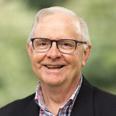


 Raphael Anzenberger General Secretary, UEBFC
Jennifer Lau Executive Director, CBM
Renée MacVicar Executive Minister, CBAC
Rob Ogilvie Executive Minister, CBWC
Leanne Friesen Executive Minister, CBOQ
Harry Gardner National Convener
Raphael Anzenberger General Secretary, UEBFC
Jennifer Lau Executive Director, CBM
Renée MacVicar Executive Minister, CBAC
Rob Ogilvie Executive Minister, CBWC
Leanne Friesen Executive Minister, CBOQ
Harry Gardner National Convener
23 wordeed · spring 2024 action

2024 marks the 150 th year of what we know today as Canadian
We are celebrating 150 years of faithful service of Baptists commissioned, sent out, and supported solely by our Canadian churches. We are humbled by the stewardship of our Baptist family as we walk united in partnership so all would hear and know the Good News of Jesus. We rejoice that Canadian Baptists have always found a way to collaborate in response to God’s call. Join us as we celebrate the legacy we have made together and shape what's yet to come.
Resources & Content (updated regularly):
• Monthly reflctions from prominent Baptist voices
• Our original worship song “Be the Church, Sent Out”
• Stories from Alumni
• Greetings from our partners in the fi eld



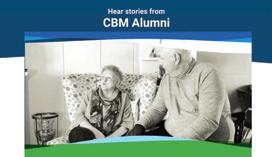
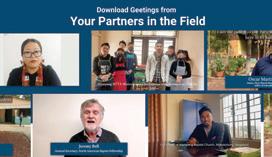
FSC Logo here CBM · 7185 Millcreek Drive · Mississauga, Ontario L5N 5R4 Email: communications@cbmin.org Tel: 905.821.3533 cbmin.org facebook.com/cbmin.org @canadianbaptistministries @canadianbaptistministries @cbminorg @canadianbaptistministries
Baptist Ministries.
CABA150 .ca






















 by Sam Chaise
by Sam Chaise









 Raphael Anzenberger General Secretary, UEBFC
Jennifer Lau Executive Director, CBM
Renée MacVicar Executive Minister, CBAC
Rob Ogilvie Executive Minister, CBWC
Leanne Friesen Executive Minister, CBOQ
Harry Gardner National Convener
Raphael Anzenberger General Secretary, UEBFC
Jennifer Lau Executive Director, CBM
Renée MacVicar Executive Minister, CBAC
Rob Ogilvie Executive Minister, CBWC
Leanne Friesen Executive Minister, CBOQ
Harry Gardner National Convener





